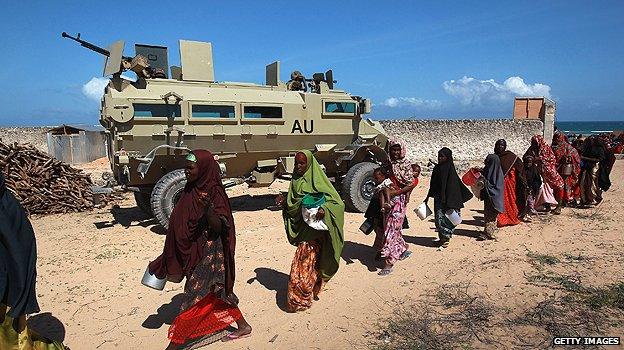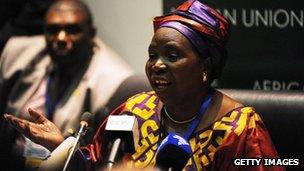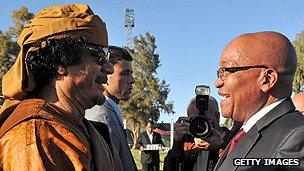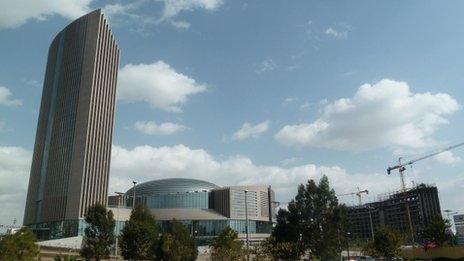Profile: African Union
- Published

The African Union has taken part in efforts to stabilize conflict areas, such as Somalia
The African Union, or AU, is a pan-African organisation whose goal is to propel a united continent towards peace and prosperity.
The AU supports political and economic integration among its 54 member nations. It aims to boost development, eradicate poverty and bring Africa into the global economy.
The AU succeeded the Organisation of African Unity (OAU) in 2002. In its later years the OAU - which originated in the decolonisation struggles of the early 1960s - had been criticised for becoming a mere talking shop.
Conceived by the then Libyan leader Muammar Gaddafi as a "United States of Africa", its structure is loosely modelled on that of the European Union.
It inaugurated a pan-African parliament in March 2004 - one of a number of proposed institutions. The body debates continent-wide issues and advises AU heads of state.
There are far-reaching plans to set up a human rights court, a central bank and monetary fund, and by 2023 an African Economic Community with a single currency.
Non-interference policy dumped
The AU believes that conflicts must be settled before there can be a chance of achieving prosperity. To this end, it set up a Peace and Security Council in 2004. The council may intervene in conflicts, replacing the old OAU principle of non-interference with one of "non-indifference".
The council can deploy military forces in situations which include genocide and crimes against humanity. It can authorise peacekeeping missions. The council planned to have a Standby Force of rapid-reaction troops in place by 2010, but this has yet to happen.
AU peacekeepers have served in Burundi and AU ceasefire monitors have served in the western Sudanese region of Darfur. An AU force has also been deployed in Somalia since March 2007.
The AU oversees the New Partnership for Africa's Development (Nepad), an anti-poverty blueprint which offers a bargain with the West: the promotion of good political and economic practice in return for more aid and investment.
Morocco left the Organisation of African Unity in 1984, after the OAU granted membership to the Saharan Arab Democratic Republic set up by the independence movement in the disputed territory of Western Sahara. It was readmitted in early 2017.
The African Union has regularly suspended member-states over coups d'etat, re-admitting them when they return to constitutional rule. Madagascar has been suspended since 2009 after Andry Rajoelina seized power, and has yet to be re-admitted. The Union suspended Mali in March 2012 over a coup.
South Sudan became the 54th member-state in the summer of 2011.
Leadership
Chairman: Post holders rotate on annual basis
Assembly: The assembly comprises the heads of state of member countries, who meet at least once a year. It is the AU's main decision-making body. Members of the assembly elect an AU chairperson, to hold office for 12 months.
Executive Council: The council comprises the foreign ministers of member states, who advise the assembly members.

Nkosazana Dlamini-Zuma was the first female AU Commission leader
Commission: The administrative branch comprises 10 commissioners, who hold individual portfolios. The commission implements AU policies and coordinates the body's activities and meetings.
The commission elects its chairperson to a four-year term.
Issues and challenges
Its critics have questioned whether the AU can be more effective than its predecessor. They point out that many of its leaders are the same people who presided over the OAU, an organisation that became known as the "dictators' club".

South African President Jacob Zuma, right, representing the AU, met the then Libyan leader Muammar Gaddafi to try resolve the conflict there
The AU came in for criticism over its failure to act earlier over the civil war in Libya. There was talk that the AU Commission, under Gabon's Jean Ping, had not given sufficient backing to a South African-sponsored peace plan, which itself was criticised for not requiring Muammar Gaddafi to step down.
The Libya dispute prompted the ultimately successful challenge to Mr Ping from South Africa's Nkosazana Dlamini Zuma, the wife of President Jacob Zuma, for the post of commission chairperson.
Concern over China
Money is another sticking point. There are doubts about whether the AU - many of whose member nations are struggling to tackle domestic poverty - can afford to fund some of its ambitious schemes.
The union, keen that its activities should be bankrolled by member countries, has eschewed the "begging bowl" principle. But in 2004 the commission chairman warned that the AU needed the kind of financial lifeline that the US gave to post-war Europe.
China has paid for a new AU headquarters in Addis Ababa at a cost of $200m, prompting some concern among African observers that China is trying to buy influence in the AU as it extends its economic presence on the continent.
Under a voluntary "peer review" scheme, AU members are expected to ensure that each other's governments adhere to democratic principles and sound economic practice. But their political will to do so has been questioned by doubters. Sceptics point out that, while promoting pan-African democracy, some AU nations are run by autocrats.
- Published28 January 2012

- Published30 January 2012
